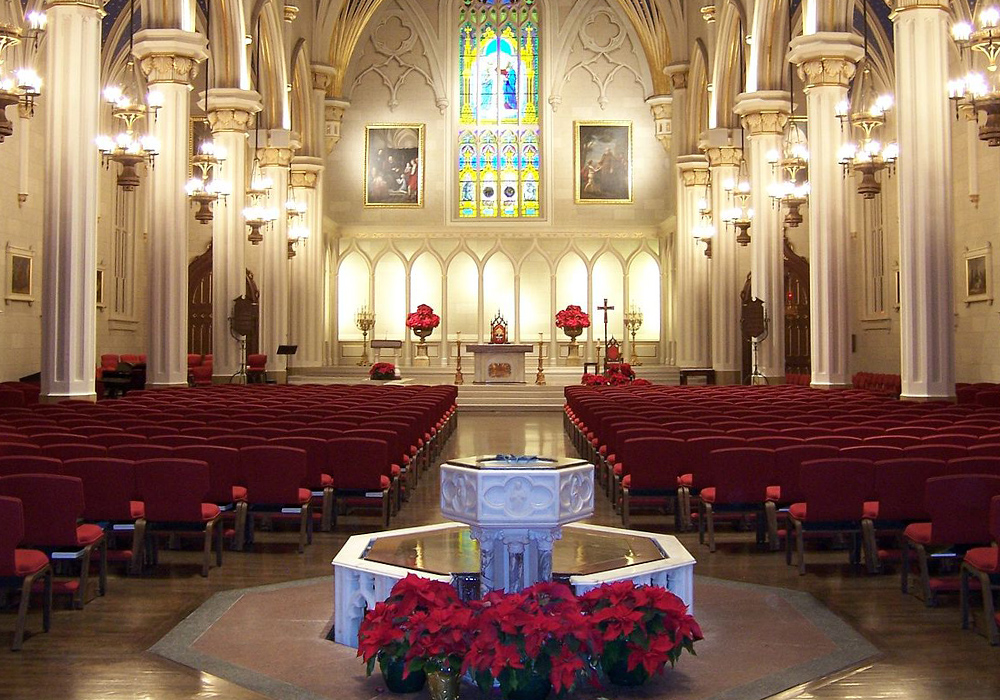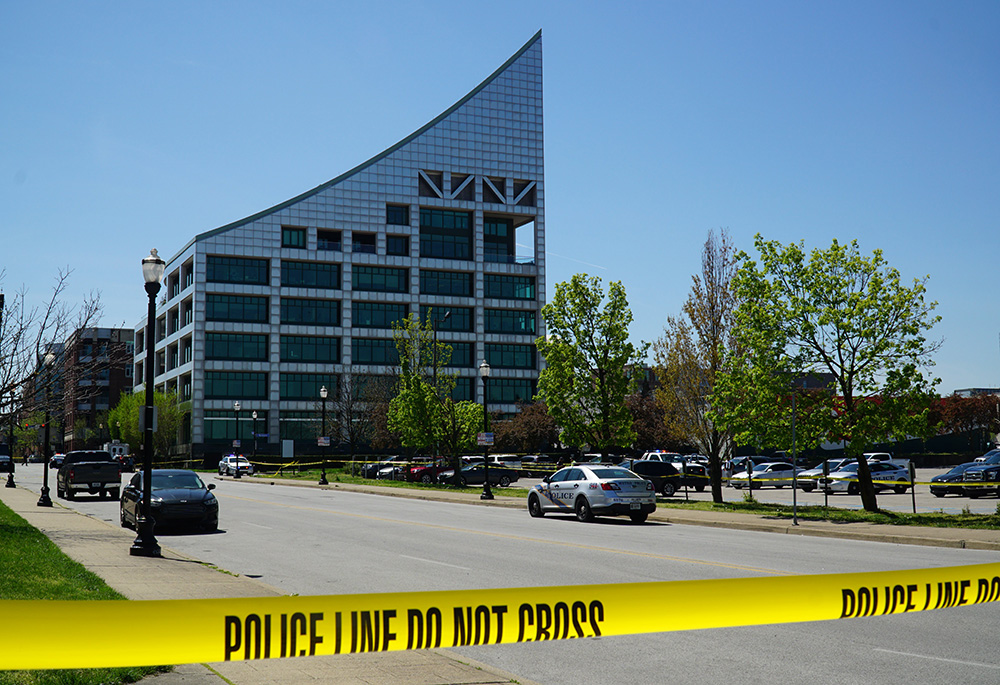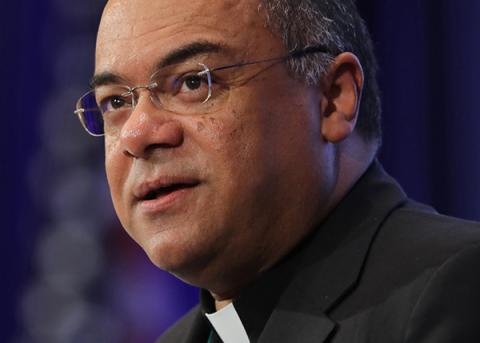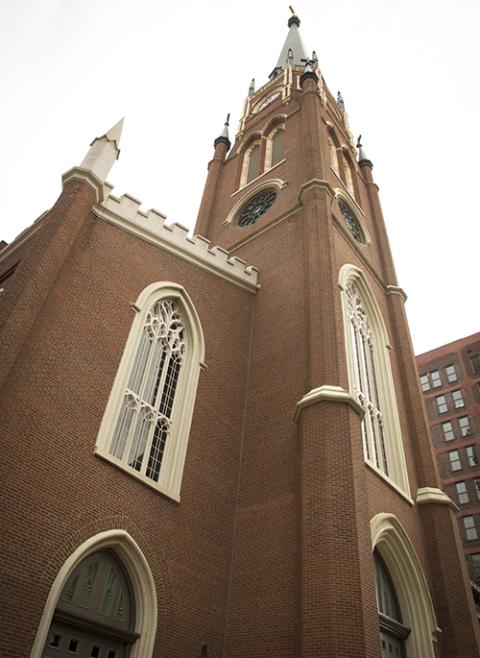
The interior of the Cathedral of the Assumption in Louisville, Kentucky, is pictured in a 2006 photo. (Wikimedia Commons, CC BY-SA 3.0)
Last week, I ventured to Louisville to visit a friend and while there I received a lesson from Lumen Gentium, the Second Vatican Council's Dogmatic Constitution on the Church. This lesson came at an interfaith service held at the historic Cathedral of the Assumption in downtown Louisville.
Lumen Gentium adopted many metaphors to describe the church: the pilgrim people of God, the mystical body of Christ, the sheepfold "whose one and indispensable door is Christ," living stones of the temple of the Holy Spirit, and "our mother." The most foundational metaphor, however, is that of a sacrament. The opening paragraph states that "the Church is in Christ like a sacrament or as a sign and instrument both of a very closely knit union with God and of the unity of the whole human race."
The "whole human race" is, like the Catholic Church, found in particular places and times. In our time and in this country, the human race has been under attack in recent years as mass shooting after mass shooting takes our loved ones and dulls our civic senses. On April 10, a gunman walked into the Old National Bank building on East Main Street and opened fire, killing five people and wounding eight others. A few days later, another two people were killed and four wounded by a gunman, this time at Chickasaw Park, on the banks of the Ohio River.

Police tape cordoned off North Preston Street at Witherspoon in downtown Louisville, Kentucky, after a mass shooting in the Old National Bank building April 10. (OSV News/The Record Newspaper/Marnie McAllister)
How to begin the slow process of healing after such nightmares? How to undull our senses? How to respond? The Center for Interfaith Relations, which has long been based out of the cathedral, reached out to civic and religious leaders, inviting them to come together.
"The Louisville interfaith community came together to acknowledge and address our broken hearts and anxious minds after the recent mass shooting and the ongoing senseless gun violence in our community," Archbishop Shelton Fabre, who offered the opening and closing prayers at the service, told me.

Archbishop Shelton Fabre of Louisville is pictured in a 2019 photo. (CNS photo/Bob Roller)
"I believe that our coming together was also an expression of our hope as people of faith that going forward, our community's discussions and efforts to truly seek to address gun violence and mass shootings will lead us to prudent answers and actions," he said. "Gun violence and mass shootings have caused the death of so many innocent people, bringing heartbreak and pain into so many families. May God guide us together into the answers and actions we need."
Louisville is a very Catholic city, which surprises people who think everything below the Mason-Dixon Line is the Bible Belt. The Diocese of Bardstown (which moved to Louisville in 1841) was created at the same time as the Dioceses of New York, Philadelphia and Boston and was the first diocese west of the Allegheny Mountains, Joe Gerth, longtime reporter and now columnist at the Louisville Courier-Journal, told me before the service.
"This is still a very Catholic place — culturally if not religiously," Gerth said. "People here still identify with their Catholic roots. They treat the summer picnics at the Catholic churches and Lenten fish fries as homecomings even if they haven't attended Mass in years."
Like all of America, Louisville is also increasingly diverse. Sitting on the altar alongside the archbishop were representatives of the Baptist, Buddhist, Episcopalian, Hindu and Jewish faith traditions.

The Cathedral of the Assumption, featured in this Nov. 3, 2016 photo, is a prominent architectural landmark in downtown Louisville, Kentucky. (CNS/Chaz Muth)
Turney Berry, chair of the Center for Interfaith Relations, recalled the more recent history in his welcoming remarks. "More than a generation ago, maybe 30 or 35 years ago, Archbishop Thomas Kelly looked at this historic building, the tallest spire west of the Alleghenies in 1852 when it opened, and said this building is not only the seat of the diocese and the home of the parish but it should be and is properly sacred yet public civic space," Berry, who is Methodist, said. "And he did that so that we could convene like this. He created an organization, the Cathedral Heritage Foundation, now the Center for Interfaith Relations, and chaired it for many, many years. We continue that legacy."
Louisville Mayor Craig Greenberg, who was himself shot at by an activist during last year's campaign, spoke to the heartache all felt. "We're grieving and trying to understand and reconcile the tragic loss of life from gun violence that's occurred recently, that's occurred in the past, and is far too likely to continue happening," he told the assembled worshipers.
"When it comes to this epidemic of gun violence, thoughts and prayers are an important first step in the process of addressing this challenge and the root causes that have created it and fueled it," the mayor said. "Of course, thoughts and prayers must not be the only step. They must lead to action. Meaningful action."
Dr. Jason Smith, chief medical officer at University of Louisville Health, is well known to Americans because of his powerful comments at a press conference held after the bank shooting. At the cathedral he spoke about how gun violence robs families of their loved ones but also robs the community of a part of its soul.
"It takes a small piece of the nurse that's holding the hand of the family waiting for the news, and it takes a small piece of the surgeon that often delivers the news to brothers, husbands, daughters, and wives, that their loved ones are not coming home," he said.
Advertisement
Not far from the cathedral is the University of Louisville's Christina Lee Brown Envirome Institute, which studies various types of personal and social health. Ted Smith, who directs the institute's Center for Healthy Air, Water and Soil, spoke about the need to prevent such shootings in the first place.
"As your neighbor coming down the street a few blocks from our physical trauma treatment facilities, I'm committed to becoming a new kind of first responder/essential worker," Smith said. "One that is there before the brokenness. Before the ambulance door opens to reveal the victim of a gunshot wound from a hopefully failed homicide or too often suicide. We know that before that moment there are hundreds of moments where we could create better circumstances that make healthy, nonviolent choices, the easy choice."
It has been a long time since I have been to a cathedral for an interfaith service of this kind. Increasingly, Americans do not look to the church for guidance or answers and most bishops do not engage in the life of their cities the way they did even 50 years ago. As gun violence breaks more and more hearts, however, and as our political structures seem incapable of addressing the anxiety unleashed by gun violence, perhaps it is time for our cathedrals to again become a central focus of their cities' civic life. Perhaps in addition to the laboratories of our universities, we need to focus on the mystery of human life, on the questions that lay over the horizon. Perhaps we need to rediscover that part of our souls that finds enlightenment when the light comes streaming through the stained-glass windows of an historic cathedral. Last week, in Louisville, I saw those "perhaps" become incarnate, and it gave me and an entire city a bit of hope.








